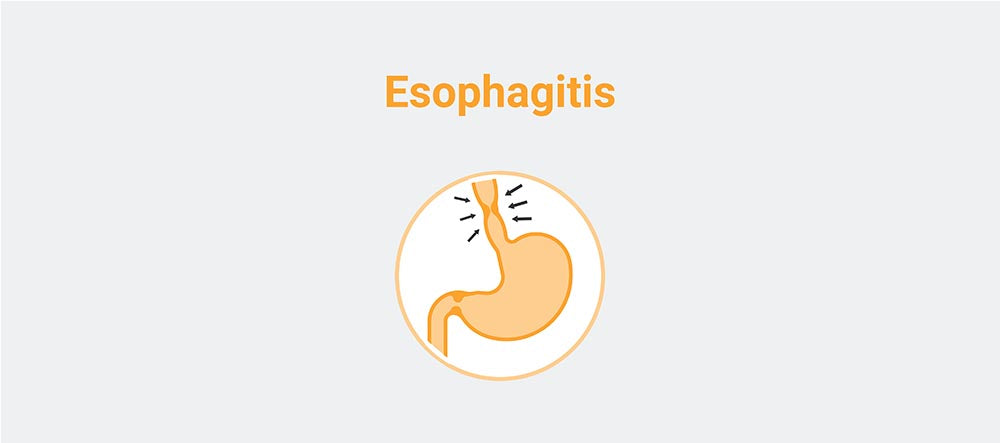
Related Product

Reflux Relief System
$199.99 USD
Say goodbye to nighttime Acid Reflux & GERD pain without sacrificing comfort.
9 Medical Conditions That Cause or Mimic Acid Reflux Beyond Heartburn
Share
Heartburn is a common issue that millions of Americans experience daily. It happens when stomach acid flows back into the esophagus, creating a burning pain in the chest.
This pain is a common symptom of GERD. But several other conditions can cause a burning feeling in your chest. As a result, many people confuse acid reflux for other conditions, raising questions about whether it is brought on by GERD and costochondritis or by another condition.
With over 60 million Americans experiencing heartburn each month, it's a common struggle. While food choices often trigger heartburn, several underlying health conditions may be the real culprit.

Want to learn more?
This helpful guide makes things clear and easy to understand. We'll explain the main distinctions between GERD and costochondritis and look at nine medical conditions that mimic heartburn so you can identify the real cause of your pain.
What Is Heartburn?
Heartburn is a symptom that occurs when stomach acid refluxes from the stomach into the esophagus. When stomach acid makes contact with the delicate lining of the esophagus, it damages the lining. Taking steps to reduce stomach acid reflux can help relieve heartburn, but it’s an ongoing battle for many people.
Symptoms of Heartburn
-
Burning sensation in the chest.
-
Pain that may worsen after meals or at night.
-
Discomfort when bending over or lying down.
What Is the Primary Cause of Heartburn?
Heartburn occurs when stomach acid refluxes into the esophagus. The esophagus lining cannot handle acid, leading to a characteristic burning pain. The most common underlying condition for frequent heartburn is Gastroesophageal Reflux Disease (GERD).
Because chest pain can have different causes, many people wonder: Is my chest pain costochondritis or acid reflux? The difference lies in how the pain presents.
-
Acid reflux or GERD pain usually feels like a burning sensation that rises from the stomach into the chest, often after eating or lying down. It can also come with a sour taste, regurgitation, or a lump-in-the-throat feeling.
-
Costochondritis causes sharp, aching, or pressure-like pain in the front of the chest where the ribs meet the breastbone. The key sign is that pressing on the area reproduces the pain, something acid reflux does not do.
What Conditions Can Cause Heartburn?
If you’re experiencing heartburn, you likely have several questions. How long does heartburn last?
What causes heartburn? What conditions cause heartburn?
Below, we’ll take a look at nine health conditions that cause heartburn and address some more questions about heartburn.

1. Angina Can Be Mistaken for Heartburn
Angina happens when your heart doesn’t get enough blood flow, often due to blocked arteries. The chest pain from angina can feel very similar to heartburn or GERD, which is why people often confuse the two.
However, angina pain tends to spread to the arm, jaw, or neck and may also come with dizziness, sweating, or nausea. Heartburn pain usually follows meals or lying down, while angina is often triggered by exertion.
Note: Seek immediate emergency care if you have severe chest pain, especially with shortness of breath, cold sweating, vomiting and nausea, fatigue, and dizziness.

2. Stomach Ulcers or Chest Pain
Yes, stomach ulcers can cause burning sensations in the abdomen or chest that mimic heartburn. Ulcers are sores that develop in the stomach lining, often due to excess acid, infection (like H. pylori), or long-term medication use.
Since the pain feels like reflux, people may confuse ulcers with GERD or acid reflux. Getting tested is important because untreated ulcers can worsen, bleed, or cause more serious complications.

3. Gallstones Lead to Heartburn
Gallstones are hardened deposits in the gallbladder that may cause digestive issues, including heartburn-like symptoms. They interfere with bile flow, which is needed for fat digestion. When gallstones block a duct, symptoms include indigestion, bloating, nausea, and sharp abdominal or chest pain.
Because gallstones can lead to serious complications if untreated, doctors may recommend dietary changes, medications, or surgery. Proper diagnosis is essential when heartburn-like symptoms persist.

4. Pleuritis or Costochondritis Feel Like Heartburn
Yes. Both pleuritis (inflammation of the lung lining) and costochondritis (inflammation of the cartilage between ribs) can cause chest pain that feels like heartburn. The discomfort is often sharp, worsens with movement or deep breathing, and may be mistaken for acid reflux.
One common question often asked by patients is whether costochondritis can cause acid reflux. While it doesn’t directly cause reflux, the anxiety and stress from chest pain can worsen reflux symptoms.
This is why costochondritis and GERD are often mentioned together in medical discussions, as both can overlap and confuse diagnosis.

5. Esophageal Cancer Causes Heartburn
Esophageal cancer can cause heartburn because the tumor blocks or irritates the esophagus, making it harder for food and stomach acid to pass smoothly. This irritation often leads to a burning sensation in the chest. Frequent heartburn may be an early warning sign requiring medical attention.
Long-term reflux can damage the esophagus and lead to a condition called Barrett’s esophagus, which sometimes develops into cancer.
Symptoms that may indicate a serious condition include
-
Difficulty swallowing
-
Unintentional weight loss
-
Persistent chest pain
-
Vomiting
Early diagnosis improves outcomes, so it’s important to manage reflux with medical guidance and lifestyle changes to lower risks associated with esophageal cancer.

6. Hiatal Hernia Causes Acid Reflux
Yes. A hiatal hernia occurs in the upper stomach, near the area where acid reflux and other symptoms occur.
If you’re experiencing pain in your upper abdomen that isn’t accompanied by a sour taste in your mouth or a burning sensation, your pain could result from a hiatal hernia. A hiatal hernia typically requires surgery to repair, so ask your doctor if surgery is right for you upon diagnosis.

7. Gastroparesis Trigger Heartburn
Gastroparesis is a medical condition in which the muscles in the stomach don't move food as they should for it to be digested. Because food lingers in the stomach, it increases pressure and the chance of acid reflux, leading to frequent heartburn.
Doctors may suggest smaller meals, dietary changes, or medications that help the stomach empty faster. Addressing this underlying issue is essential because untreated gastroparesis can cause poor nutrition and make reflux symptoms worse.

8. Esophagitis Causes Heartburn
Yes. Esophagitis is inflammation of the esophagus, and one of its most common causes is acid reflux. Repeated exposure of the esophagus to stomach acid irritates its lining, leading to pain, swelling, and burning.
Symptom triggers include certain medications, allergies, and infections. Identifying esophagitis early can prevent chronic irritation and reduce the risk of developing Barrett’s esophagus.

9. Anxiety Lead to Heartburn
Yes. In some cases, anxiety can actually lead to heartburn and make GERD symptoms worse. If you’ve tried all the basic acid reflux treatment options and none of them are working, it could be anxiety that’s making your reflux worse.
If you’re dealing with anxiety as well as heartburn, make sure you talk to your doctor about treating your physical and cognitive symptoms.

FAQs
Q: What condition most commonly causes heartburn?
A: The most common condition that causes heartburn is GERD, or gastroesophageal reflux disease. GERD causes the acid from your stomach to reflux up into your esophagus, where it makes contact with your esophageal lining and causes serious damage. There are several potential causes of GERD and behaviors that increase your risk of developing GERD, so it’s important to avoid smoking, maintain a healthy weight, and eat a healthy diet.
Q: When should I be concerned about heartburn?
A: Be concerned if heartburn is frequent, severe, or unresponsive to over-the-counter medications. Most importantly, seek immediate medical attention if chest pain is crushing, accompanied by shortness of breath, or feels different from your typical heartburn, as these could be signs of a heart attack.
Q: Why do I get heartburn every day?
A: Eating too much or eating trigger foods can lead to acute cases of heartburn, even in people who do not suffer from GERD. If you’ve noticed that you get heartburn every day no matter what you eat or what position you sleep in, you’re probably dealing with GERD. Risk factors include:
-
Obesity
-
Pregnancy
-
Smoking
-
Hiatal hernia
-
Certain medications
Q: What does excessive heartburn indicate?
A: Excessive heartburn most commonly indicates Gastroesophageal Reflux Disease (GERD), the chronic form of acid reflux. It signals that the mechanism designed to keep stomach acid in your stomach is frequently failing. This isn't just occasional discomfort from a large meal; it's a persistent medical condition. Ignoring excessive heartburn is dangerous because the ongoing acid exposure can lead to serious complications

Key Takeaway
Chest pain can feel alarming, especially when you’re unsure whether it’s from costochondritis or acid reflux. While both can cause discomfort, their origins and treatments are very different. Costochondritis comes from inflammation in the chest wall, while GERD is tied to stomach acid and digestion. Getting the right diagnosis is the first step, and ruling out heart-related issues with a doctor is always essential.
If your symptoms point to acid reflux or GERD, consistent management can make a real difference. Lifestyle changes, proper medication, and nighttime relief strategies all play an important role in keeping symptoms under control.
At MedCline, we design specialized sleep solutions that help reduce reflux by keeping you comfortably elevated at night. Our Reflux Relief System is designed to offer relief from heartburn by offering gentle support while you sleep.
Related Product

Reflux Relief System
$199.99 USD
Say goodbye to nighttime Acid Reflux & GERD pain without sacrificing comfort.


